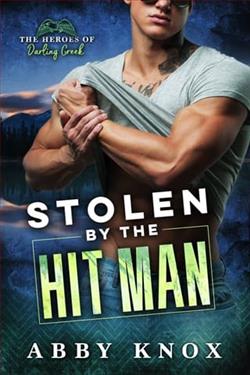Page 33 of Love Off-Limits
The more I learned about Stonebrook, the more perfect it seemed.
Once I was finished with HR, Kelly walked me to the bunk house, her two Great Danes, Sergeant and Samson, bounding beside us as we moved down the path. I was almost distracted by how enormous the dogs were. I was tall, and their heads still hit me above my waist. They were friendly, which made them slightly less intimidating, but they still commanded a certain respect. Maybe that’s why Kelly had them with her.
“I know,” Kelly said, noting my gaze still fixed on the dogs. “They’re huge. I promise you get used to it.”
“Will I, though?” I said with a smile.
Sergeant nuzzled his nose into my hand and woofed. I scratched his ears warily, relaxing once his tail started to wag.
“Seriously. They wouldn’t hurt a fly. But they do make the new farmhands pay attention. And I need all the help I can get.”
Kelly had a commanding presence, but she couldn’t be any older than I was. I could see how it might get tricky managing a large staff of people who likely looked at her like she was a peer.
We passed under the huge maple trees that lined the drive, shading the paved, single-lane road with their massive branches. The road turned sharply to the left and went down a little slope to what seemed like the farm center of the property, completely out of view of the main farmhouse and the massive pavilion I’d seen when I pulled up the drive. Kelly stopped at a T in the road and pointed to the left. “The bunkhouses are down that way. White bunkhouses are for the farmhands, blue are for the event staff. They’re all the same inside, but you keep different hours and have different days off, so it’s easier to keep you split. There’s a bathroom at either end of each house, and they’re all air-conditioned, so you’ll sleep comfortable at least.” She looked my way. “Are you from around here?”
“From Charleston,” I said.
“Oh. Well then you’d probably be fine even without AC. It’s not nearly as hot here as it is down there.”
A soft breeze blew through the trees and rustled past us as if to illustrate her point. “Yeah, it definitely feels nicer here.”
“In between the bunkhouses, there’s a common room with couches, chairs, a TV, and a pool table. You’ll eat your meals up at the catering kitchen behind the main farmhouse.Notin the dining room. That’s just for guests. There’s a cafeteria in the back where employees eat.”
I nodded. “Got it.”
“Down this way is the farm.” She led me down the paved path. “This is where you’ll spend most of your time.”
We stopped within sight of four different outbuildings. Kelly pointed to the largest, a massive red barn that looked more pink in the afternoon light, first. “This is the goat barn,” she said. “We have four dozen goats that provide the goat’s milk that goes into Mrs. Hawthorne’s soaps. What she doesn’t use, we sell in the farm store and to a half-dozen restaurants all over Western North Carolina that buy it to make cheese.”
She pointed across the way. “Chickens are over here. Past the coop is the supply shed, and just beyond that, the pig barn. They’re the furthest away from the main farmhouse because they smell the worst.” She eyed my outfit. “You’ll want a bandana or something to wear across your face. Some days are smellier than others.”
I nodded. “I.. . am sufficiently terrified.”
She only grinned.
“Work starts at seven a.m. sharp five days a week. You’re finished by five most days. Sometimes a little earlier. Later if you’re handling the evening milking, which doesn’t happen until seven. Saturdays and Sundays are off.”
“The evening milking?”
“They’re dairy goats. Milked twice a day like clockwork. It’s the most time-sensitive chore on the farm, so if you plan to screw up, best do it when you’re shoveling manure or doing something a little more forgiving.”
“Noted.” I pointed out each of the structures she’d already identified. “So, dairy goats, chickens, supplies, smelly pigs.” I pointed past the pig barn, where the road continued around a bend, disappearing from view. “Where does that go?”
“That’ll take you out to the backside of the apple orchards, past Mrs. Hawthorne’s studio—that’s where she makes her soap—and eventually to the strawberry fields, the French Broad River, and the Hawthorne homestead.” She pointed to yet another path that led in between the goat barn and the supply shed. “This’ll take you to the east pasture and eventually circle around to the pavilion at the front of the property.”
“I don’t think I’m going to remember all of this.”
“Oh, you won’t. No one ever does. You’ll likely get lost at least a dozen times in your first week. But cell service is good. And Bob should have given you my number. Just call if you can’t find your way back.”
I cleared my throat. “Right. Um, Olivia said something about a farm store where I could pick up a few things. Anything specific you’d recommend?”
She chuckled. “You aren’t dressed for work now, that’s for sure.”
I shrugged. “I didn’t really expect...Olivia’s a friend,” I said sheepishly. “I needed a place to be for a little while. If I can be useful while I’m here, I’d like to be.” It wasn’t exactly how things had gone down. But it was close enough to the truth that I didn’t think Olivia would know the difference should Kelly ever repeat back what I’d said.
“Feed ’n Seed will get you fixed right up,” Kelly said. “Ask for Ann. Tell her I sent you and she’ll get you everything you need. Plus a sugar cookie or two if you’re nice to her. You aren’t the first city boy we’ve had come through the farm.”
I winced at her categorization. Charleston was a city, yes. And I admittedly had exactly zero experience working on a farm. Butcity boyseemed so negative. I glanced down at my hands and thought of the hours they’d spent holding a video camera or curled over my laptop as I edited and spliced and polished episode after episode ofRandom I. I hadn’t even had to mow the lawn growing up. My parents had paid for a lawncare service same as most people in our neighborhood.















